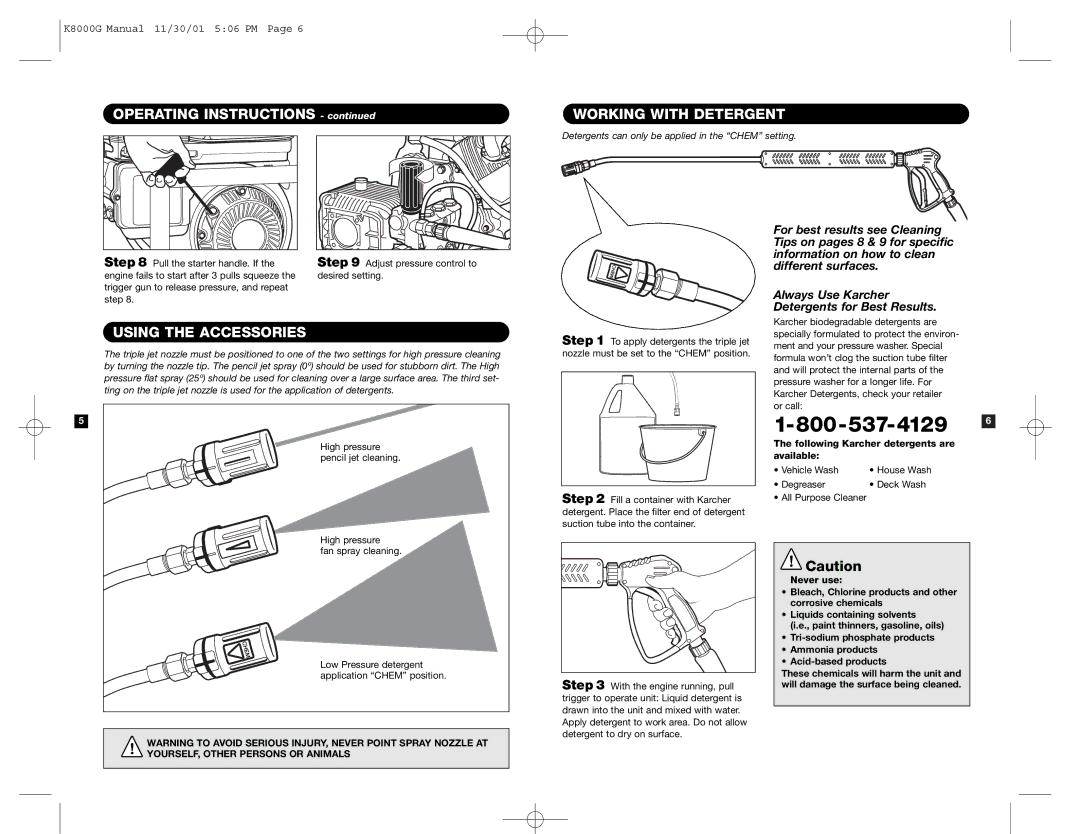
K8000G Manual 11/30/01 5:06 PM Page 6
OPERATING INSTRUCTIONS - continued
WORKING WITH DETERGENT
Detergents can only be applied in the “CHEM” setting.
Step 8 Pull the starter handle. If the | Step 9 Adjust pressure control to |
engine fails to start after 3 pulls squeeze the | desired setting. |
trigger gun to release pressure, and repeat |
|
step 8. |
|
USING THE ACCESSORIES
The triple jet nozzle must be positioned to one of the two settings for high pressure cleaning by turning the nozzle tip. The pencil jet spray (0º) should be used for stubborn dirt. The High pressure flat spray (25º) should be used for cleaning over a large surface area. The third set- ting on the triple jet nozzle is used for the application of detergents.
5 |
High pressure |
pencil jet cleaning. |
High pressure |
Step 1 To apply detergents the triple jet nozzle must be set to the “CHEM” position.
Step 2 Fill a container with Karcher detergent. Place the filter end of detergent suction tube into the container.
For best results see Cleaning Tips on pages 8 & 9 for specific information on how to clean different surfaces.
Always Use Karcher
Detergents for Best Results.
Karcher biodegradable detergents are specially formulated to protect the environ- ment and your pressure washer. Special formula won’t clog the suction tube filter and will protect the internal parts of the pressure washer for a longer life. For Karcher Detergents, check your retailer
or call:
6 | ||
| ||
The following Karcher detergents are |
| |
available: |
|
|
• Vehicle Wash | • House Wash |
|
• Degreaser | • Deck Wash |
|
• All Purpose Cleaner |
|
|
fan spray cleaning. |
Low Pressure detergent |
application “CHEM” position. |
WARNING TO AVOID SERIOUS INJURY, NEVER POINT SPRAY NOZZLE AT YOURSELF, OTHER PERSONS OR ANIMALS
Step 3 With the engine running, pull trigger to operate unit: Liquid detergent is drawn into the unit and mixed with water. Apply detergent to work area. Do not allow detergent to dry on surface.
![]() Caution
Caution
Never use:
•Bleach, Chlorine products and other corrosive chemicals
•Liquids containing solvents
(i.e., paint thinners, gasoline, oils)
•
•Ammonia products
•
These chemicals will harm the unit and will damage the surface being cleaned.
